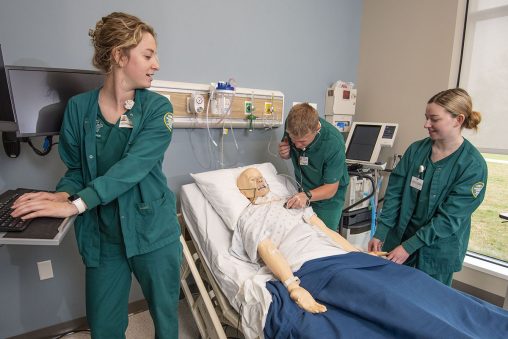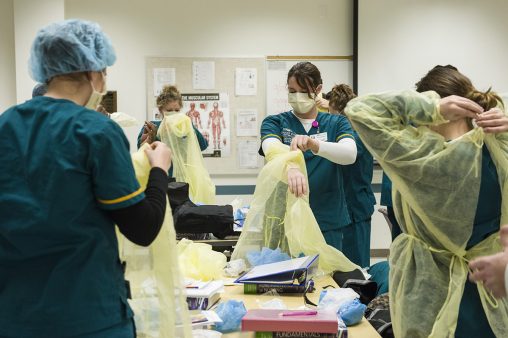
The Department of Nursing will redesign its B.S.N. curriculum to ensure nursing students have developed important leadership skills and are practice-ready when they graduate.
Wright State University’s Department of Nursing was one of 10 universities selected nationwide for a pilot project to transform its undergraduate nursing curriculum to ensure that more students are practice-ready when they graduate.
Wright State received a $100,000 grant from the American Association of Colleges of Nursing to develop and implement a competency-based learning and assessment curriculum.
The redesigned curriculum will focus on developing nursing students’ leadership skills and ensuring they have mastered the skills needed to safely care for patients when they graduate and enter the workforce. The effort includes enhancing how nursing faculty assess their students’ nursing skills and competence.
“What we’re trying to do is create practice-ready graduates. The gap between a graduate who is ready to practice and those who are not has been widening and the goal of our grant is to decrease that gap,” said Ann Bowling, Ph.D., associate professor of nursing and assistant chair of nursing programs at Wright State.
The curriculum will also emphasize the development of students’ leadership skills and professionalism. In addition to being practice-ready, B.S.N. graduates will be expected to have the skills needed to lead a team that might include other registered nurses, licensed practical nurses and aides.
“Graduates have to be ready to care for patients and know how to be safe,” said Marty Sexton, Ph.D., professor of nursing and associate dean of the College of Health, Education and Human Services at Wright State. “Baccalaureate nurses are also expected to be bedside leaders when they graduate, and we want to make sure they can lead a team.”
To help students develop their leadership and nursing skills, the Department of Nursing has partnered with Premier Health on the grant project.
“Premier is excited to partner with Wright State as we work together to prepare registered nurses for the future,” Lisa Gossett, system chief nursing officer and chief experience officer at Premier Health. “Our industry is changing significantly, and with that, we need to ensure our RNs are prepared for their leadership role among the health care team so that we can best meet the needs of the patients we serve. Our partnership with Wright State is critically important, and we are excited about this grant opportunity to deepen that partnership.”
Through the project, Premier Health will provide increased clinical rotations and preceptorships for Wright State nursing students at the organization’s sites.
Wright State students are exposed to diverse patient populations across the lifespan in multiple Premier Health facilities and receive clinical opportunities in obstetrics, psychiatry, women’s health, medical and surgical units, emergency department, step-down units and intensive care units.
Providing students with clinical experiences in health care settings is an emphasis of Wright State’s B.S.N. degree program.
Nursing students spend 776 hours in clinical experiences, including 200 hours in a capstone experience during their final semester. This capstone experience is a clinical preceptorship during which they work in one of the region’s hospitals supervised by a registered nurse caring directly for patients.

In addition to being practice-ready, Wright State undergraduate nursing students will receive training to lead a team that might include other registered nurses, licensed practical nurses and aides.
The Department of Nursing has relationships with more than 200 local health care agencies and all of the region’s major health care organizations, including Premier Health.
The grant project will also emphasize to students the importance of interprofessional collaboration and communication in health care settings.
Through clinical experiences and capstone projects, nursing students work closely with other health care providers at Premier Health sites, including doctors, other nurses, aides, therapists and social workers. Students will learn the importance of communicating clearly with patients and their health care teams.
“Interprofessional in its true sense means the entire health care team. Premier gives us an opportune setting to do that,” Sexton said. “If we teach our students to speak up, to talk to the physicians, to talk to the respiratory therapist, to not be afraid to challenge, we’re going to have a safer environment.”
The new curriculum will also include training Wright State nursing students to provide care for patients in their homes through services like telehealth and home visits.
Bowling said there has been a national shift from providing care in hospitals and doctors’ offices to population-based settings.
“The goal is to provide care to patients where they are,” she said. “So we want to make sure our students know that health care doesn’t just exist in an acute care setting but that it exists everywhere.”
In addition, students will learn how not to just examine patients’ physical health and symptoms but also to assess the economic and social conditions that influence individual and group differences in health status.
Wright State received support for the effort to create the new curriculum from the American Association of Colleges of Nursing (AACN) as part of its national Competency-Based Education for Practice-Ready Nurse Graduate initiative.
The AACN works to establish quality standards for nursing education; assists schools in implementing those standards; influences the nursing profession to improve health care; and promotes public support for professional nursing education, research, and practice. The association represents more than 850 member schools of nursing at public and private universities nationwide.
Wright State University’s baccalaureate degree program in nursing is accredited by the Commission on Collegiate Nursing Education, an autonomous accrediting agency of the AACN, and approved by the Ohio Board of Nursing.
Wright State’s College of Health, Education and Human Services offers a three-year and four-year Bachelor of Science of Nursing program that prepares self-directed graduates at the Dayton and Lake campuses to work in a number of settings and in collaboration with other health professionals to coordinate and improve the health care of individuals, families and communities.

 Walking through open doors
Walking through open doors  Adventures await
Adventures await  Wright State to expand nursing facilities to meet workforce needs and prepare more graduates for in-demand careers
Wright State to expand nursing facilities to meet workforce needs and prepare more graduates for in-demand careers  Wright State student-athletes make a lasting impact on local family with more to come
Wright State student-athletes make a lasting impact on local family with more to come  Wright State names Rajneesh Suri dean of Raj Soin College of Business
Wright State names Rajneesh Suri dean of Raj Soin College of Business 